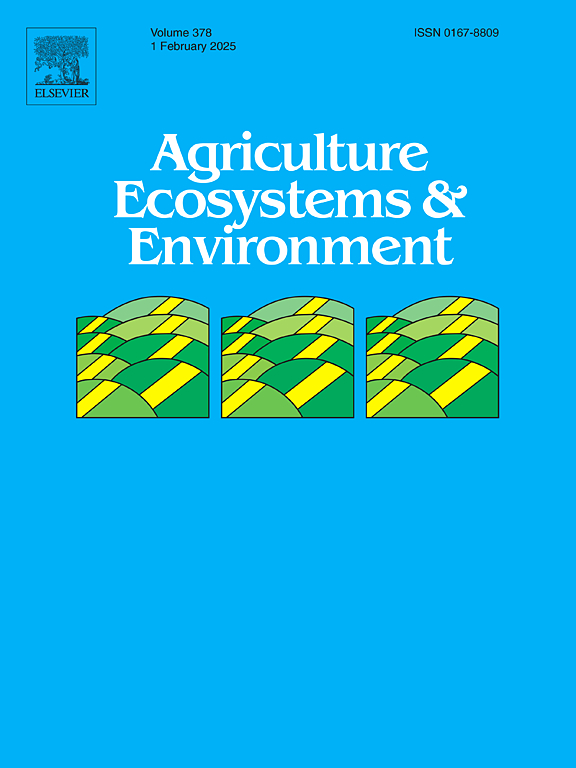Effects of irrigation on vegetation, mesofauna and organic matter decomposition in Mediterranean vineyards
IF 6
1区 农林科学
Q1 AGRICULTURE, MULTIDISCIPLINARY
引用次数: 0
Abstract
Increasing temperatures and resulting stronger spring and summer drought have exponentially increased irrigation in Mediterranean vineyards. So far, little is known about the potential effects of irrigation on vineyard agroecosystems. The aim of this study is to assess the effect of vineyard irrigation on vegetation, soil mesofauna, the decomposition of organic matter, grapevine yield and berry sugar content. Five pairs of vineyards were selected in South-eastern France (Luberon), each comprising an irrigated and a non-irrigated vineyard. The irrigated vineyards received on average 60 mm of water which doubles usual summer rainfall. Under-vine vegetation and soil mesofauna were analysed during the growing season (April) and the following summer drought (August). Organic matter decomposition was tested using tea bags that were buried from January to May in the grapevine row. We found a significant difference in vegetation cover between treatments in April but not in the following August. Springtail and mite abundance were only different between treatments in August being higher in irrigated vineyards. In August, we also found significant differences between treatments in the structure of the soil mesofauna community. The effect of irrigation on the decomposition of organic matter was not significant. Grapevine yield was higher in irrigated vineyards but no effect on the chlorophyll index of grapevine leaves was found. This study highlighted the effect of irrigation showing that even moderate irrigation has significant effects on Mediterranean vineyard ecosystems. The strong increase of irrigated vineyards advocates for further research to obtain a better understanding of irrigation consequences under different pedoclimatic conditions.
灌溉对地中海葡萄园植被、中游动物和有机质分解的影响
气温升高以及由此导致的春季和夏季更严重的干旱,使地中海葡萄园的灌溉呈指数增长。到目前为止,人们对灌溉对葡萄园农业生态系统的潜在影响知之甚少。本研究的目的是评估葡萄园灌溉对植被、土壤中系动物、有机质分解、葡萄产量和浆果含糖量的影响。在法国东南部(吕贝隆)选择了五对葡萄园,每对葡萄园包括一个灌溉和一个非灌溉葡萄园。灌溉后的葡萄园平均降雨量为60 毫米,是夏季降雨量的两倍。在生长期(4月)和随后的夏季干旱期(8月)对藤下植被和土壤中系动物进行了分析。有机物质分解测试使用茶叶袋埋在1月至5月葡萄藤行。4月不同处理间植被覆盖差异显著,8月差异不显著。不同处理间春尾虫和螨的丰度不同,灌溉葡萄园8月份春尾虫和螨的丰度较高。8月,我们还发现不同处理间土壤中系动物群落结构存在显著差异。灌溉对土壤有机质分解的影响不显著。灌溉后葡萄产量较高,但对葡萄叶片叶绿素指数无影响。本研究强调了灌溉对地中海葡萄园生态系统的影响,表明即使是适度的灌溉也会对地中海葡萄园生态系统产生重大影响。灌溉葡萄园的强劲增长推动了进一步的研究,以更好地了解不同土壤条件下的灌溉后果。
本文章由计算机程序翻译,如有差异,请以英文原文为准。
求助全文
约1分钟内获得全文
求助全文
来源期刊

Agriculture, Ecosystems & Environment
环境科学-环境科学
CiteScore
11.70
自引率
9.10%
发文量
392
审稿时长
26 days
期刊介绍:
Agriculture, Ecosystems and Environment publishes scientific articles dealing with the interface between agroecosystems and the natural environment, specifically how agriculture influences the environment and how changes in that environment impact agroecosystems. Preference is given to papers from experimental and observational research at the field, system or landscape level, from studies that enhance our understanding of processes using data-based biophysical modelling, and papers that bridge scientific disciplines and integrate knowledge. All papers should be placed in an international or wide comparative context.
 求助内容:
求助内容: 应助结果提醒方式:
应助结果提醒方式:


